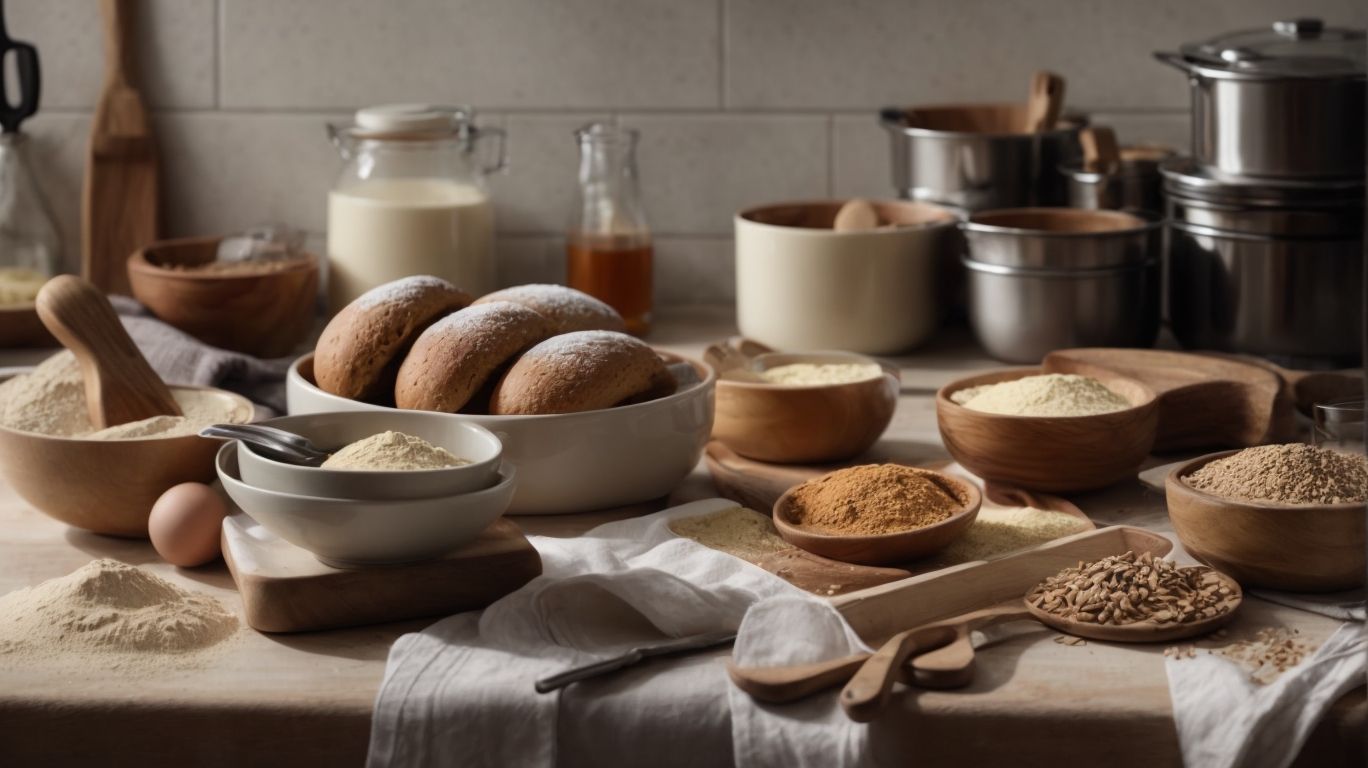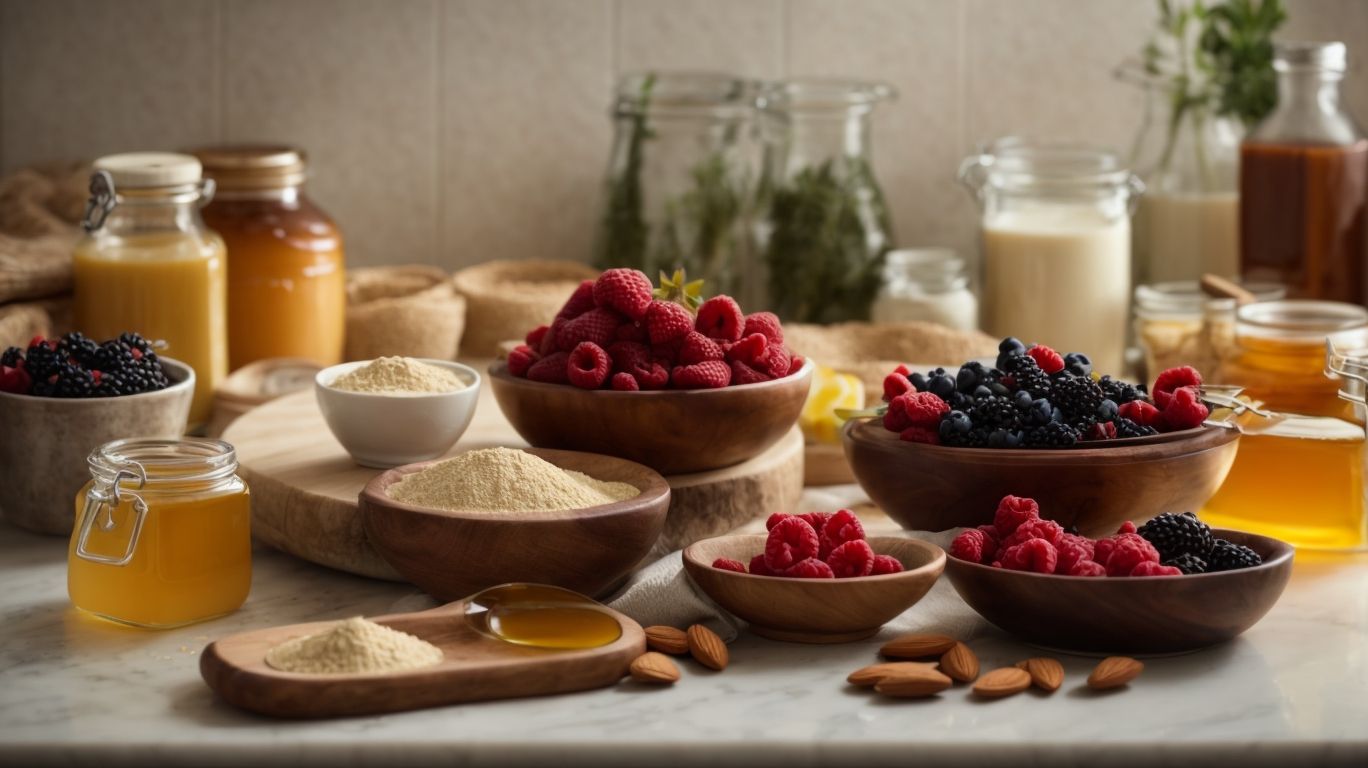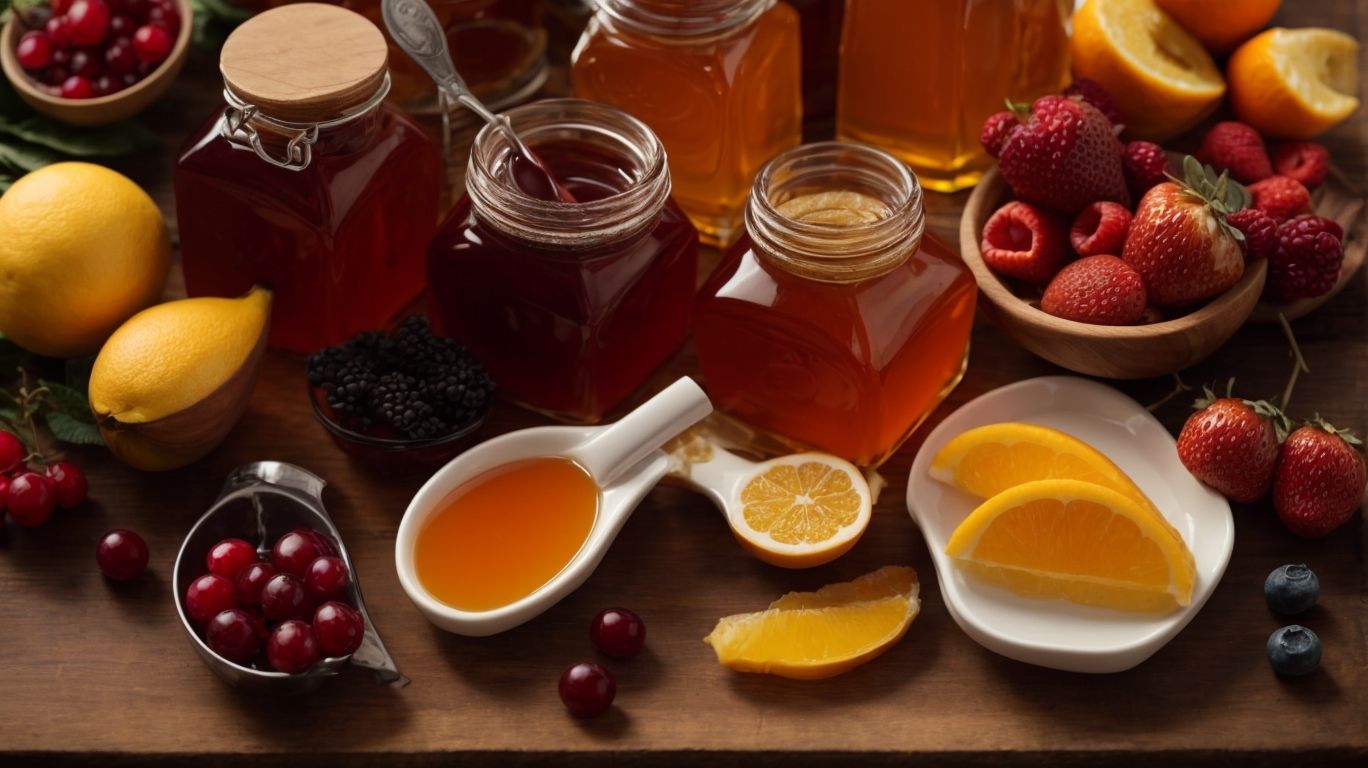How to Bake Without Refined Sugar?
Are you looking to cut down on refined sugar in your baking but not sure where to start?
This article will explore what refined sugar is, why it’s best to avoid it, and discover the various alternatives available.
From natural sweeteners to artificial substitutes, we will show you how to successfully substitute refined sugar in your baking.
Learn about the benefits of baking without refined sugar and get some useful tips for achieving delicious results.
Key Takeaways:
What is Refined Sugar?
Refined sugar refers to sugar that undergoes processing to remove impurities and color, resulting in a crystalline form.
During the refining process, the raw sugar juice extracted from sugarcane or sugar beets undergoes various steps, including purification, crystallization, and drying. This process eliminates minerals, proteins, and other non-sugar components, resulting in a product that is almost entirely sucrose.
Unlike natural sugars found in fruits and vegetables, refined sugar lacks the accompanying nutrients and fiber, making it a source of empty calories. Its fine texture and high sweetness level make it ideal for various culinary applications, such as baking, confectionery, and beverage production.
Why Should You Avoid Refined Sugar?
Avoiding refined sugar is crucial for maintaining optimal health and preserving dental hygiene.
Refined sugar, found abundantly in processed foods and sugary beverages, poses significant negative impacts on the body. Excessive consumption of refined sugar is closely linked to obesity, diabetes, heart disease, and even certain types of cancer. This highly processed substance not only leads to weight gain but also increases the risk of insulin resistance, inflammation, and other metabolic disorders.
The effects of refined sugar on dental health are equally concerning. When consumed frequently, it can contribute to tooth decay, cavities, and gum disease. The bacteria in the mouth feed on sugars, producing acids that erode the enamel and lead to oral health issues.
What are the Alternatives to Refined Sugar?
Alternatives to refined sugar include a variety of natural and artificial sweeteners such as honey, maple syrup, Stevia, Monk Fruit, and Erythritol.
While honey and maple syrup offer a rich and distinctive flavor profile, they also give baked goods a moist and dense texture.
- Stevia, derived from the Stevia rebaudiana plant, has gained popularity for being intensely sweet with little to no calories. Its plant-based origin appeals to health-conscious consumers looking to reduce sugar intake.
- On the other hand, Monk Fruit provides a balanced sweetness without the bitter aftertaste often associated with artificial sweeteners.
- Erythritol, a sugar alcohol, is known for its cooling effect in the mouth and is frequently used in sugar-free products.
Natural Sweeteners (Honey, Maple Syrup, Agave Nectar)
Natural sweeteners like honey and maple syrup offer a flavorful and wholesome alternative to refined sugar in various culinary creations.
When you substitute honey or maple syrup in your recipes, not only do you add a touch of natural sweetness, but you also introduce complex flavors and aromas that can enhance the overall taste profile of your dishes. The subtle floral notes of honey or the rich, caramel undertones of maple syrup can take your culinary creations to the next level.
These natural sweeteners bring additional benefits besides just sweetness. Honey, for example, is renowned for its antibacterial and antioxidant properties, while maple syrup is a good source of manganese and zinc, essential minerals for overall wellness.
When developing recipes, it’s crucial to understand the unique characteristics of honey and maple syrup to ensure proper integration. Honey works well in marinades, dressings, and baked goods, providing moisture and a distinctive taste, whereas maple syrup shines in glazes, sauces, and desserts, imparting a luxurious sweetness.
Fruit Purees (Applesauce, Banana, Date Paste)
Fruit purees like applesauce, banana, and date paste serve as nutritious and naturally sweet substitutes in alternative baking and dessert preparation.
When incorporated into recipes, these fruit purees not only add natural sweetness but also provide moistness and a rich flavor profile. The texture-enhancing properties of fruit purees make them excellent binders and add a soft, tender crumb to baked goods. For example, in vegan baking, applesauce can replace eggs due to its binding ability, while date paste can add a deep caramel-like sweetness to desserts.
These purees are versatile and can be used in a wide range of desserts, from cookies and muffins to cakes and bread. From banana bread to applesauce cake, the possibilities are endless when using fruit purees in baking!
Artificial Sweeteners (Stevia, Monk Fruit, Erythritol)
Artificial sweeteners like Stevia, Monk Fruit, and Erythritol provide zero-calorie sugar alternatives with varying levels of sweetness and flavor profiles.
One of the key advantages of artificial sweeteners, such as Stevia, Monk Fruit, and Erythritol, is their minimal impact on blood sugar levels. Due to their zero-calorie nature, they are often recommended for individuals looking to manage their blood sugar levels or reduce their overall sugar intake.
- These sweeteners also possess taste similarities to sugar, with some even argued to mimic the taste of traditional sugar quite closely.
- Stevia, for example, is known for its intense sweetness that comes with a slight bitter aftertaste.
- Monk Fruit offers a more subtle sweetness reminiscent of traditional sugars.
- Erythritol provides a mild sweetness with almost no aftertaste.
In terms of baking, artificial sweeteners such as Stevia, Monk Fruit, and Erythritol can be suitable substitutes for sugar. It is important to note that their sweetness levels differ, so it may require experimentation to achieve the desired taste and texture in baked goods.
How to Substitute Refined Sugar in Baking?

Credits: Poormet.Com – Adam Jackson
Substituting refined sugar in baking requires careful measurement and experimentation with different sweeteners to achieve desired taste and texture.
When replacing refined sugar with alternatives like honey, maple syrup, or stevia, it’s crucial to adjust the liquid content in your recipe accordingly. Since these substitutes vary in sweetness and moisture levels, you may need to reduce the amount of other liquids used. This adjustment will help maintain the right consistency in your baked goods and prevent them from becoming too dry or dense.
When using natural sweeteners like coconut sugar or date paste, consider the flavor profile of these substitutes. They can impart distinct flavors to your bakes, so it’s essential to balance them with complementary ingredients. Experiment with spices, extracts, or citrus zest to enhance the overall taste and create a harmonious flavor profile.
Measure Correctly
Correct measurement of sweeteners and other ingredients is essential when substituting refined sugar in baking to ensure recipe success.
When substituting refined sugar with alternative sweeteners like honey, maple syrup, or stevia, precision in measurements is key for achieving the desired sweetness level without compromising the texture and structure of baked goods. Incorrect ratios can lead to overly sweet or bland results, as well as affect the moisture content and browning of the final product. This attention to detail also plays a crucial role in maintaining the overall flavor profile and ensuring consistency in each batch of treats.
Adjust Liquids
When using coconut sugar or other sweeteners in baking, adjusting liquid content in recipes may be necessary to maintain proper moisture levels and texture.
Coconut sugar, known for its rich caramel-like flavor and lower glycemic index compared to refined sugar, can significantly impact the final outcome of your baked goods.
Substituting coconut sugar for regular sugar adds depth to the flavor profile, but since coconut sugar tends to absorb moisture more than refined sugar, the overall consistency of your batter or dough may be affected. Consequently, increasing the amount of liquids like milk, water, or oil in your recipe can help to compensate for this absorption, ensuring your baked treats remain moist and delicious.
Experiment with Different Sweeteners
Exploring a variety of sweeteners like Lakanto and sugar alcohols allows for discovering unique flavor profiles and sweetness levels in baked goods without refined sugar.
When baking, using various sweeteners such as Lakanto can bring a whole new dimension to your creations. The beauty of Lakanto lies in its ability to mimic the sweetness of sugar without the added calories or impact on blood sugar levels. Sugar alcohols, such as erythritol, can also be a fantastic alternative that provides sweetness without the guilt. By experimenting with different combinations and ratios of sweeteners, you can customize the taste of your baked goods to suit your preferences, all while reducing the overall sugar content.
Benefits of Baking Without Refined Sugar
Baking without refined sugar offers numerous benefits such as creating gluten-free options and utilizing natural sweeteners like coconut palm sugar for enhanced flavor.
By eliminating refined sugar from your baking recipes, you not only reduce the risk of various health issues linked to excessive sugar consumption but also cater to dietary preferences like gluten-free diets.
Coconut palm sugar, as a natural sweetener, adds a unique flavor profile that enhances the taste of your baked goods without the guilt associated with refined sugars. Coconut palm sugar is considered to have a lower glycemic index compared to traditional sugar, making it a favorable choice for those monitoring their blood sugar levels.
Healthier for Your Body
Opting for sugar substitutes like erythritol in baking results in healthier baked goods that are lower in calories and glycemic impact, supporting overall well-being.
One of the key benefits of using erythritol and other sugar substitutes in baking is their ability to provide the sweetness of sugar without the associated negative health effects. These substitutes can be a great option for individuals looking to manage their weight or blood sugar levels. Since erythritol is not metabolized by the body in the same way as sugar, it does not contribute to tooth decay, making it a more tooth-friendly alternative for baking purposes.
Better for Your Teeth
Choosing sweeteners like Swerve over refined sugar contributes to better dental health by reducing cavity risk and minimizing enamel erosion.
By opting for alternatives such as Swerve in baking, individuals can enjoy their favorite treats while being mindful of their oral hygiene. Swerve is known for its tooth-friendly properties, as it does not promote the growth of harmful bacteria that cause cavities. Unlike refined sugar, which can lead to acid production damaging enamel, Swerve helps maintain a more neutral pH level in the mouth, minimizing the risk of erosion. This makes it a preferred choice for those looking to satisfy their sweet cravings without compromising their dental well-being.
More Flavorful Baked Goods
Using monkfruit in desserts enhances the flavor profile of baked goods, offering a natural sweetness without the need for refined sugar.
Monkfruit, also known as Luo Han Guo, is a small green gourd native to Southern China. It is renowned for its intense sweetness, which comes from natural compounds called mogrosides. These mogrosides not only provide a sweet taste but also offer health benefits, making monkfruit a popular choice for those looking to reduce their sugar intake.
When incorporated into desserts, monkfruit brings a unique dimension to the flavor, giving a subtle fruity undertone that complements various ingredients. Its versatility allows it to be used in a wide range of recipes, from cakes and cookies to ice creams and custards.
Tips for Baking Without Refined Sugar

Credits: Poormet.Com – Jeffrey Young
When baking without refined sugar, follow recipes by trusted sources like Gemma Stafford or platforms like taste.com.au for expert guidance on using sugar alcohols effectively.
Sugar alcohols are a popular alternative to refined sugar in baking, imparting sweetness without causing a spike in blood sugar levels. When incorporating sugar alcohols into your baking, it’s essential to note that they are not as sweet as sugar, so you may need to adjust the quantities in your recipes accordingly.
To ensure optimal baking results with sugar alcohols, consider using recipes that have been specifically developed and tested for these alternative sweeteners. Gemma Stafford is known for her expertise in creating delicious sugar-free treats that retain their taste and texture.
Use Recipes Specifically Designed for Sugar-Free Baking
Utilize recipes curated by experts like Alison Adams or platforms like Food Network for specialized guidance on creating delectable sugar-free baked goods.
Sugar-free baking can be a challenging yet rewarding endeavor, requiring precise measurements and alternative ingredients to achieve the perfect texture and taste in your treats. By following trusted sources, such as Alison Adams, who is renowned for her expertise in sugar-free recipe development and the detailed instructions provided by Food Network, you can ensure that your creations turn out just as delicious as their traditional counterparts.
Alison Adams, a pioneer in the realm of sugar-free baking, offers innovative and reliable recipes that cater to various dietary needs and preferences, making it easier for enthusiasts to enjoy guilt-free indulgences without compromising on flavor or quality. On the other hand, Food Network’s vast collection of recipes not only provides a diverse range of options for sugar-free baked goods but also includes tips and tricks from experienced culinary professionals, enhancing your baking skills and creativity in the kitchen.
Use High-Quality Ingredients
Opt for high-quality ingredients such as sorbitol and maltitol when baking without refined sugar to ensure superior taste and texture in your baked creations.
These premium ingredients, commonly used as sugar alcohols, play a crucial role in sugar-free baking due to their unique properties.
Sorbitol, known for its mild sweetness and ability to retain moisture, helps create moist and tender baked goods. On the other hand, maltitol, with its sugar-like taste and excellent crystallization properties, contributes to the desired texture and mouthfeel in sugar-free treats.
By incorporating sorbitol and maltitol into your recipes, you can achieve a delightful balance of sweetness while maintaining a lower glycemic impact.
Don’t Be Afraid to Experiment
Embrace experimentation with sugar alcohols in your baking endeavors to discover unique tastes and textures that redefine traditional sweet treats without refined sugar.
By incorporating sugar alcohols like xylitol, erythritol, or maltitol into your recipes, you can enjoy the sweetness without the guilt of excess sugar. These sugar alternatives offer a range of benefits, such as lower calorie content and reduced impact on blood sugar levels.
Get creative with your ingredient substitutions and explore how each sugar alcohol affects the flavor profile and consistency of your baked goods. Challenge yourself to create a sugar-free masterpiece that dazzles your taste buds and impresses your friends and family.
Frequently Asked Questions
How to Bake Without Refined Sugar?
What is refined sugar and why should I avoid it in baking?
Refined sugar is a highly processed form of sugar that is stripped of its nutrients and can contribute to health issues such as diabetes and obesity. It also lacks flavor, making it unnecessary in baking.
How to Bake Without Refined Sugar?
What are some healthier alternatives to refined sugar in baking?
Some great alternatives to refined sugar include honey, maple syrup, coconut sugar, and fruit purees such as applesauce or mashed bananas. These options add natural sweetness and can provide added nutrients.
How to Bake Without Refined Sugar?
Can I use the same amount of alternative sweetener as the recipe calls for in refined sugar?
It’s important to note that alternative sweeteners can have a different level of sweetness than refined sugar. It’s best to start with a smaller amount and adjust to your desired level of sweetness.
How to Bake Without Refined Sugar?
How can I modify a recipe that calls for refined sugar to use alternative sweeteners?
For every 1 cup of refined sugar, you can substitute 3/4 cup of honey or maple syrup, 2/3 cup of coconut sugar, or 1 cup of fruit puree. You may need to adjust other ingredients, such as reducing the amount of liquid, to maintain the consistency of the batter.
How to Bake Without Refined Sugar?
Can I use alternative sweeteners in any type of baking?
Alternative sweeteners work well in most baked goods, but they may not caramelize or have the same texture as refined sugar. It’s best to test out different options in your favorite recipes to find what works best for you.
How to Bake Without Refined Sugar?
Are there any other benefits to baking without refined sugar?
Yes, using alternative sweeteners can add more flavor and depth to your baked goods, as well as provide added nutrients. Plus, you’ll feel better knowing you’re making a healthier choice for you and your loved ones.

